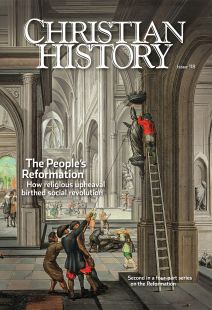Christian History Timeline: The People's Reformation
Key to this timeline’s entries:
Red background: Key events in issue 118
Orange type, Church & State
Blue type, World Events
Green type, Other Religious Developments
—c. 1440: Printing press invented
— 1480: Andreas von Karlstadt is born.
— 1483: Martin Luther is born.
— 1484: Huldrych Zwingli is born.
— c.1485: Balthasar Hubmaier is born.
— 1489: Thomas Cranmer is born.
— 1491: Henry VIII, Martin Bucer are born.
— 1492: Columbus makes first voyage to the Americas.
— 1494: William Tyndale is born.
— 1496: Menno Simons is born.
>— 1497: Philipp Melancthon is born.
— 1499: Swiss gain independence; Peter Martyr Vermigli is born.
— c. 1500: Hans Denck is born.
— 1509: John Calvin is born.
— 1509: Henry VIII of England assumes throne at 18, marries Catherine of Aragon.
— 1513: Leo X becomes Pope; John Knox is born.
— 1516: Johann Froben of Basel prints Erasmus’s Greek New Testament.
— 1517: Luther writes 95 Theses; printers spread copies throughout Germany.
— 1519: Eck debates Karlstadt and Luther at Leipzig; Zwingli begins New Testament sermons; Swiss reformation starts.
— 1520: Luther writes To the Christian Nobility, On the Babylonian Captivity of the Church, and The Freedom of a Christian.
— 1521: Leo X titles Henry VIII “Defender of the Faith” for attacking Luther’s views of the sacraments; Hadrian VI becomes pope; Luther is excommunicated at Diet of Worms.
— 1521: Religious unrest begins in Wittenberg: private Masses are abolished, Karlstadt serves Communion to the laity in both elements, religious statues are destroyed.
— 1522: Spaniards complete circumnavigation of globe.
— 1522: Zwingli argues his first Reformation debates; Adam Petri prints Luther’s New Testament.
— 1523: Clement VII becomes pope; first two Reformation martyrs are burned at the stake in Belgium.
— 1524: Luther debates Karlstadt on the Lord’s Supper.
— 1524-1525: Peasants’ War fought in Germany.
— 1525: Anabaptist movement begins in Zurich; spreads to Germany.
— 1526: Reformation spreads to Sweden and Denmark.
— 1527: Luther writes against Zwingli on the Lord*rsquo;s Supper; printer Hans Hergot is executed.
— 1527: First Protestant university (Marburg) is founded.
—1529: Luther attends Marburg Colloquy with Zwingli, but they reach no agreement on the Lord’s Supper; name Protestant first used.
— 1530: Melancthon presents Augsburg Confession, a statement of Lutheran beliefs.
— 1531: Schmalkaldic League, a body of German Protestant groups, forms in self-defense against Charles V.
—1531: Zwingli dies in battle at Kappel.
—1532: Diet of Regensburg and Peace of Nuremberg guarantee religious toleration in face of Turkish threat.
—1533: Thomas Cromwell declares Henry VIII’s marriage to Catherine null and void; Henry marries Anne Boleyn.
— 1534: Henry VIII declares himself supreme head of Church of England; Paul III becomes pope.
—1535: Anabaptist uprising at Münster put down and Anabaptists executed; Thomas More beheaded for opposing Henry VIII.
— 1536:First edition of Calvin’s Institutes published.
—1536: William Tyndale is burned at the stake; Henry VIII begins to dissolve the monasteries; Anne Boleyn is executed; Henry marries Jane Seymour, who dies in 1537 after giving birth to the future Edward VI.
—1538: Geneva expels Calvin.
— 1539: Frankfurt Truce is declared between Charles V and the Schmalkaldic League.
— 1540: Society of Jesus (Jesuits) is formed; Henry VIII marries Anne of Cleves; marriage is unconsummated, and after divorcing her he marries Catherine Howard; Philip of Hesse enters bigamous marriage with consent of Luther; conferences fail to reconcile Protestants and Catholics.
— 1541: Calvin returns to Geneva from exile.
—1541: At Conference of Regensburg, Melancthon and Bucer reach agreement with Catholics on most doctrines, but Luther and Rome reject their work; Karlstadt dies.
— 1542:Catherine Howard is executed.
— 1542: Paul III establishes the Inquisition.
— 1543: Copernicus writes that the earth revolves around the sun; Henry VIII marries Catherine Parr, who will outlive him.
— 1545: Council of Trent, for reform of the Catholic Church, opens.
— 1546: Luther dies.
— 1546–1547: Schmalkaldic War fought between Protestant and Catholic territories in Germany.
—1547: Henry VIII’s Protestant son, Edward VI, succeeds him.
— 1548: Augsburg Interim makes some concessions to Protestants in Germany, but many Catholic and Protestant leaders refuse to accept it.
—1549: First edition of the Book of Common Prayer is published.
— 1549: John Knox is released from French imprisonment.
—1553: Edward VI’s Catholic half-sister, Mary, succeeds him.
— 1554: Knox travels to Geneva and meets Calvin.
— 1555: Peace of Augsburg allows German rulers to determine religion of their regions; Mary burns Hugh Latimer, Nicholas Ridley, and Thomas Cranmer at the stake.
—1558: Mary’s Protestant half-sister, Elizabeth, succeeds her.
— 1560: Scottish Parliament abolishes Catholicism in Scotland in the “Reformation of 1560.”
This article is from Christian History magazine #118 The People’s Reformation. Read it in context here!
Christian History’s 2015–2017 four-part Reformation series is available as a four-pack. This set includes issue #115 Luther Leads the Way; issue #118 The People’s Reformation; issue #120 Calvin, Councils, and Confessions; and issue#122 The Catholic Reformation. Get your set today. These also make good gifts.
By the editors
[Christian History originally published this article in Christian History Issue #118 in 2016]
Next articles
BONUS ONLINE CONTENT: What’s in a name?
The surprising origin of the term “Protestant”
Jennifer Woodruff TaitBONUS ONLINE CONTENT: The road not taken II
Cardinal Contarini and the Colloquy of Regensburg
David C. SteinmetzBONUS ONLINE CONTENT: The unlucky cardinal
Reginald Pole might have been Queen Mary’s husband or a reforming pope. Instead, he lost everything
David C. SteinmetzSupport us
Christian History Institute (CHI) is a non-profit Pennsylvania corporation founded in 1982. Your donations support the continuation of this ministry
Donate





